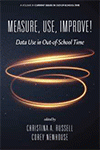
Measure, Use, Improve!
Data Use in Out-of-School Time
Edited by:
Christina A. Russell, Policy Studies Associates
Corey Newhouse, Public Profit
A volume in the series: Current Issues in Out-of-School Time. Editor(s): Helen Janc Malone, Institute for Educational Leadership.
Published 2021
Measure, Use, Improve! Data Use in Out-of-School Time shares the experience and wisdom from a broad cross-section of out-of-school time professionals, ranging from internal evaluators, to funders, to researchers, to policy advocates. Key themes of the volume include building support for learning and evaluation within out-of-school time programs, creating and sustaining continuous quality improvement efforts, authentically engaging young people and caregivers in evaluation, and securing funder support for learning and evaluation.
This volume will be particularly useful to leadership-level staff in out-of-school time organizations that are thinking about deepening their own learning and evaluation systems, yet aren’t sure where to start. Authors share conceptual frameworks that have helped inform their thinking, walk through practical examples of how they use data in out-of-school time, and offer advice to colleagues.
Book reviews and associated articles:
Journal of Youth Development: Book Review - Measure, Use, Improve! Data Use in Out-of-School Time
Sperling Center: Q&A with Christina A. Russell and Corey Newhouse
The Forum for Youth Investment: Measure, Use, Improve! Data Use in Out-of-School Time
CONTENTS
Foreword, Beth Gamse, Julie Spielberger, and Angeline Spain. Introduction, Christina Russell. PART I: SETTING THE STAGE: THE VALUE OF MEASUREMENT AND EVALUATION. Taking Stock: Investing in Measuring Our Work in Out-of-School Time, Regino Chávez. What’s Your Why? Matching Evaluation Approach to Organizational Need, Jason Spector. Using Data for Learning: A Funder’s Perspective, Rebecca M. Goldberg, Ashleigh L. Halverstadt, and Alex C. Hooker. PART II: BUILDING BLOCKS FOR EVALUATION. Demystifying Data: Strategies and Tools for Making Data More Meaningful in OST Programs, Hannah Lantos, Zakia Redd, Brandon Stratford, and Aasha Joshi. Navigating Data Systems Selection: Tools to Ease the Journey, Betsy Block. So What, Now What: A Game-Winning Plan for Capacity Building, Tasha Johnson and Aasha Joshi. From Quantity to Quality: Lessons Learned From an Ongoing Statewide Initiative, Kim Firth Leonard, Celeste Janssen, and Belle Cantor. Putting Data to Work for Young People: Bridging Practice and Research Through Continuous Improvement, Jessica Donner, Anamarie Auger Whitaker, Ann Durham, and Lisa Gomi Hui. Youth Participation in Evaluation: Lessons From the Past, Opportunities for the Future, Joseph Luesse and Kim Sabo Flores. PART III: DEVELOPING SYSTEMS OF EVALUATIVE THINKING. Building Effective Continuous Quality Improvement Systems: The Need for Evaluative Thinking About Out-of-School Time Program Quality, Tiffany Berry and Michelle Sloper. Building Evaluative Thinking Skills and Capacity Through M3® (Making Meaning with Multiple Data Sets), Jocelyn Wiedow and Jennifer Griffin-Wiesner. A Reservoir of Insight: Tapping Youth Feedback to Inform Continuous Learning, Valerie Threlfall. How a Frontier State Grew OST Quality From the Ground Up, Linda Barton, Kathy Schleyer, and Ellen Gannett. Beyond Youth Outcomes: Thinking Outside the Logic Model, Bryan Hall and Brenda McLaughlin. PART IV: USING DATA AND EVALUATION TO IMPROVE STAFF CAPACITY. Giving Data a Voice Through Coaching: The Michigan Example, Jamie Wu, Trevor Davies, Lorraine Thoreson, and Laurie Van Egeren. Walk the Path Together: Partnering to Advance Data Use, Miranda Yates, Stephanie Mui, and Jennifer Nix. Using Data Informed Practices to Support the Onboarding and Retention of Youth Development Professionals, Jaynemarie Enyonam Angbah. Epilogue, Corey Newhouse. Resources. About the Contributors.
REVIEWS
"This book would make good reading for practitioners just entering the field. (The whole series is a gift to anyone looking to create a strong syllabus for a youth development course!) More seasoned practitioners, researchers, evaluators, and funders will also benefit from the book’s historical perspectives and lessons learned." Elizabeth J. Starr Wellesley Centers for Women in Afterschool Matters (Read full review)
-
Paperback978-1-64802-253-1
Web price: $45.04 (Reg. 52.99)
-
Hardcover978-1-64802-254-8
Web price: $80.74 (Reg. 94.99)
- eBook978-1-64802-255-5

- EDU011000 - EDUCATION: Evaluation & Assessment
- EDU030000 - EDUCATION: Testing & Measurement
- EDU038000 - EDUCATION: Student Life & Student Affairs
-
 At Our Best
Building Youth-Adult Partnerships in Out-of-School Time Settings
At Our Best
Building Youth-Adult Partnerships in Out-of-School Time Settings
-
 Changemakers!
Practitioners Advance Equity and Access in Out-of-School Time Programs
Changemakers!
Practitioners Advance Equity and Access in Out-of-School Time Programs
-
 It Takes an Ecosystem
Understanding the People, Places, and Possibilities of Learning and Development Across Settings
It Takes an Ecosystem
Understanding the People, Places, and Possibilities of Learning and Development Across Settings
-
 Social and Emotional Learning in Out-Of-School Time
Foundations and Futures
Social and Emotional Learning in Out-Of-School Time
Foundations and Futures
-
 Special Education During the Pandemic
Considerations for Change in Practice
Special Education During the Pandemic
Considerations for Change in Practice
-
 The Growing Out-of-School Time Field
Past, Present, and Future
The Growing Out-of-School Time Field
Past, Present, and Future
-
 The Heartbeat of the Youth Development Field
Professional Journeys of Growth, Connection, and Transformation
The Heartbeat of the Youth Development Field
Professional Journeys of Growth, Connection, and Transformation

